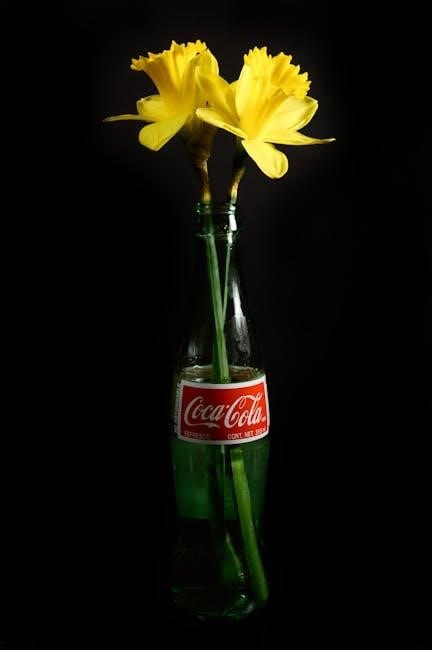The Washington County Recycling Guide offers comprehensive details on proper recycling practices, accepted materials, and preparation tips to ensure efficient and effective recycling within the community.
Welcome to the Washington County Recycling Guide, your go-to resource for understanding recycling practices in the area. Recycling plays a vital role in preserving natural resources, reducing landfill waste, and promoting sustainability. This guide provides detailed information on accepted materials, collection processes, and proper preparation techniques to ensure effective recycling. Whether you’re a resident or a business, understanding what can be recycled and how to prepare items is essential. Washington County offers curbside recycling programs, drop-off locations, and special collection events to make recycling convenient. By following the guidelines outlined here, you can contribute to a healthier environment and support the county’s commitment to waste reduction. Stay informed about local resources and best practices to make a positive impact through responsible recycling habits.

Accepted Materials in Washington County Recycling
Washington County accepts various recyclable materials, including paper, cardboard, glass, metal, plastics, and electronics. Proper sorting and preparation are essential for efficient processing.
Household Items Accepted for Recycling
Washington County recycling programs accept a variety of household items, including paper, cardboard, glass, metal, and plastics. Common items like newspapers, cardboard boxes, glass bottles, aluminum cans, and certain plastics (marked with recycling symbols) are accepted. Residents should ensure items are clean, dry, and free of food residue. Lids and labels can typically remain on bottles and cans. Broken glass and ceramics are generally not accepted in curbside recycling. Electronics, batteries, and hazardous waste require special handling and should not be placed in regular recycling bins. For items like furniture or large appliances, special collection events or drop-off locations are often available. Always check the county’s guidelines to confirm acceptable materials and preparation requirements.
Paper and Cardboard Recycling Guidelines
In Washington County, paper and cardboard are widely accepted for recycling. Residents can recycle newspapers, junk mail, cardboard boxes, and paperboard products like cereal boxes. Ensure all items are clean and dry, as contamination can disrupt the recycling process. Flatten cardboard boxes to save space in recycling bins. Remove any plastic or wax coatings, as these materials are not recyclable. Staples and tape on paper products are generally acceptable. Shredded paper should be bagged to prevent scattering during collection. Avoid mixing paper with other materials like glass or metal. Properly prepared paper and cardboard help maintain the efficiency of recycling programs and contribute to a more sustainable community. Always check local guidelines for specific instructions on preparing these materials for collection.
Glass and Metal Recycling Requirements
Glass and metal items are recyclable in Washington County, but proper preparation is essential. Glass bottles and jars must be empty and rinsed, with lids and labels removed. Separate glass by color if specified by local guidelines. Metal cans, including aluminum and steel, should be emptied, rinsed, and lids removed. Flatten metal cans to save space in recycling bins. Avoid recycling broken glass, window glass, or metal scrap, as these are not accepted. Ensure all items are clean and dry to prevent contamination. Check local recycling guidelines for specific instructions, as requirements may vary. Properly preparing glass and metal ensures they are processed efficiently and contributes to successful recycling efforts. Recycling these materials helps conserve resources and reduces landfill waste, supporting a more sustainable environment for the community.
Plastics Recycling: What Is Accepted
In Washington County, plastics recycling focuses on specific types of materials to ensure proper processing. Only plastics labeled with the resin codes #1 and #2 are accepted, such as water bottles, soda bottles, milk jugs, and detergent containers. These items must be clean, dry, and empty to be recyclable. Remove lids and caps, as they are not accepted in curbside recycling programs. Do not include plastics like bags, wrap, or packaging materials, as they can interfere with recycling equipment. Check local guidelines for additional restrictions. Properly preparing plastics helps maintain the quality of recyclables and supports efficient processing. By adhering to these requirements, residents can contribute to a more effective recycling system and reduce waste in the community.
Recycling Collection Process in Washington County
Washington County provides curbside recycling collection, requiring residents to prepare materials properly and follow scheduled pickup times to ensure efficient and effective waste management services.
Curbside Recycling Collection Schedule
Washington County offers curbside recycling collection, typically occurring on a weekly or bi-weekly basis, depending on the location. Residents are encouraged to check the official county website or the Solid Waste App for specific pickup schedules tailored to their address. Proper preparation of recyclables, such as ensuring materials are clean, dry, and sorted correctly, is essential for efficient collection. The county provides a detailed calendar outlining collection dates, including holidays and weather-related delays. Special collection events for bulk items are also advertised in advance. By adhering to the schedule and guidelines, residents can contribute to a more effective and sustainable recycling program. For accurate and up-to-date information, residents should consult the county’s recycling resources or contact their local waste management provider.
Preparation of Recyclables for Collection
Proper preparation of recyclables is crucial for efficient collection and processing. Residents are encouraged to ensure materials are clean, dry, and free of food residue or liquids. Containers should be rinsed thoroughly, and lids or labels can be removed if specified by local guidelines. Paper and cardboard must be flattened to save space in recycling bins. Metals, glass, and plastics should be sorted according to the county’s accepted materials list. Avoid bagging recyclables in plastic, as this can interfere with sorting machinery. Contaminated or improperly prepared items may not be collected or processed. By following these guidelines, residents can help maintain the integrity of the recycling program and contribute to a more sustainable community. Proper preparation ensures materials are effectively recycled and reduces waste in landfills.
Special Collection Events for Bulk Items
Washington County organizes special collection events for bulk items that are not typically accepted during curbside recycling. These events provide residents with an opportunity to dispose of large or hazardous materials responsibly. Items such as furniture, appliances, electronics, and certain types of construction waste can be dropped off at designated locations. Residents are usually required to pre-register and may need to provide proof of residency. Separate collection events are also held for hazardous waste, including batteries, electronics, and chemicals. These events are free or low-cost and aim to ensure that materials are recycled or disposed of safely. By participating in these programs, residents help reduce landfill waste and promote sustainability. Check the county’s official website or contact local waste management for event schedules and acceptable items.
Hazardous Waste Recycling Options
Washington County provides specialized recycling options for hazardous waste to ensure safe disposal and environmental protection. Residents can dispose of items like batteries, electronics, fluorescent bulbs, and chemicals through designated facilities. These materials are not accepted in curbside recycling and require special handling. The county operates drop-off centers where trained staff manage hazardous waste responsibly. Residents are encouraged to check the county’s website for specific guidelines, acceptable items, and drop-off locations. Proper recycling of hazardous waste prevents contamination of landfills and protects natural resources. By participating in these programs, residents contribute to a healthier environment and sustainable community practices. Always verify the most current information before visiting a facility to ensure compliance with local regulations and procedures.

Disposal Guidelines for Non-Recyclable Items
Non-recyclable items must be disposed of properly to avoid environmental harm. Check local waste management guidelines for landfill options and ensure items are not mixed with recyclables to maintain efficiency and safety.
Items Not Accepted in Curbside Recycling

Several items are not accepted in Washington County’s curbside recycling program to ensure efficient processing and safety. Plastic bags, wraps, and foam are prohibited as they can damage recycling equipment. Food-soiled or greasy materials, such as pizza boxes or fast-food containers, are not recyclable. Hazardous waste, including batteries, electronics, and chemicals, must be disposed of separately through special collection events. Broken glass, ceramics, and window glass are also excluded. Residents are encouraged to check local guidelines or use online tools like the “What Do I Do With?” program to determine proper disposal methods for non-recyclable items. Proper separation helps maintain recycling quality and environmental safety.
Risks of Improper Recycling Practices
Improper recycling practices can lead to significant environmental and operational challenges. Contaminated materials, such as food-soiled containers or non-recyclable items, can ruin entire batches of recyclables, increasing processing costs and reducing efficiency. Plastic bags and wraps, for instance, can jam recycling equipment, causing mechanical failures and safety hazards for workers. Additionally, hazardous waste disposed of improperly can leak harmful chemicals, posing risks to the environment and public health. Incorrectly recycled items may also end up in landfills, undermining recycling efforts. Residents are urged to follow guidelines to ensure clean, dry, and properly sorted recyclables. Proper practices help maintain the integrity of the recycling system and promote a healthier planet for future generations. Community awareness and education are key to minimizing these risks and fostering sustainable waste management practices in Washington County.
Proper Disposal of Electronics and Batteries
Electronics and batteries require special handling due to hazardous materials like lead, mercury, and lithium. In Washington County, residents should not dispose of these items in regular trash or recycling bins. Instead, they can be taken to designated drop-off locations, such as local recycling centers or participating retailers. Many communities host special collection events for electronics and batteries, ensuring they are processed safely and responsibly. Proper disposal prevents toxic substances from leaking into landfills and contaminating the environment. Residents are encouraged to check with local authorities or online resources for specific guidelines and collection sites. By participating in these programs, individuals can help protect public health and support sustainable waste management practices. Safe disposal of electronics and batteries is a critical step in maintaining a cleaner, greener community for future generations.

Community Resources for Recycling
Washington County offers local recycling centers, drop-off locations, and educational programs to help residents recycle efficiently and responsibly, promoting a sustainable and environmentally friendly community.
Local Recycling Centers and Drop-Off Locations
Washington County provides numerous recycling centers and drop-off locations to facilitate easy and accessible recycling for residents. These centers accept a variety of materials, including paper, glass, metal, and certain plastics. Many locations also offer special services for bulk items, electronics, and hazardous waste. To find the nearest recycling center, residents can use the county’s online search tool, which allows them to enter their ZIP code and locate convenient drop-off points. Additionally, some centers host community collection events for items like batteries and large appliances. Properly sorting and preparing materials before dropping them off ensures efficient processing and helps maintain the effectiveness of the recycling program. Visit the county’s website for a full list of locations and accepted materials to make informed recycling decisions.

Recycling Education and Outreach Programs
Washington County actively promotes recycling education through various outreach programs designed to inform and engage the community. These initiatives include workshops, school programs, and community events that educate residents on proper recycling practices. The county also offers educational materials, such as brochures and online guides, to help residents understand what materials are accepted and how to prepare them. Additionally, the “Know Before You Throw” campaign emphasizes the importance of proper sorting to avoid contamination; Local libraries and community centers often host informational sessions, providing hands-on learning opportunities. By fostering a culture of environmental awareness, these programs aim to increase participation and improve recycling rates across Washington County, ensuring a more sustainable future for all residents.
Community Events Promoting Recycling
Washington County hosts various community events to encourage recycling and environmental awareness. These events, often free and open to all residents, provide opportunities to dispose of bulk items, electronics, and hazardous waste responsibly. The county partners with local organizations to organize collection drives, educational workshops, and interactive booths. For instance, the “Recycle Right” fair offers hands-on learning about proper recycling practices. Additionally, events like “Earth Day Celebrations” feature activities for all ages, including recycling-themed games and workshops on reducing waste. These gatherings not only promote sustainability but also foster a sense of community. By participating, residents can learn how to recycle more effectively and contribute to Washington County’s environmental goals. Such events play a vital role in keeping recyclables out of landfills and fostering a culture of eco-friendly habits.
Partnerships with Local Businesses for Recycling
Washington County collaborates with local businesses to enhance recycling efforts and promote sustainability. These partnerships often involve joint initiatives, such as recycling workshops, educational campaigns, and special collection drives. Businesses may also sponsor drop-off locations or provide resources to support community recycling programs. Many local companies participate in “Recycle at Work” initiatives, encouraging employees to bring recyclable materials from home. Additionally, some businesses offer discounts or incentives for customers who bring reusable containers or participate in recycling activities. These partnerships not only strengthen community ties but also help reduce waste and increase recycling rates. By working together, Washington County and local businesses create a more sustainable environment for future generations. Such collaborations are integral to achieving the county’s environmental goals and fostering a culture of recycling.
Tips for Effective Recycling in Washington County

Tips for Effective Recycling in Washington County
Ensure recyclables are clean, dry, and sorted properly to maximize efficiency. Utilize online tools for guidance and participate in community programs to support sustainable practices countywide.
Best Practices for Sorting Recyclables
Proper sorting of recyclables is crucial for efficient processing. Separate materials like paper, cardboard, glass, metal, and plastics into designated categories. Ensure items are clean, dry, and free from food residue or liquids. Avoid mixing contaminants such as plastic bags or broken glass with other materials. Flatten cardboard and remove lids from bottles and cans. Do not bag recyclables, as this can disrupt sorting machinery. Keep electronics and hazardous waste separate, as they require special handling. Use online tools or local guides to confirm accepted items and preparation methods. By following these practices, residents can significantly improve recycling efficiency and reduce contamination rates in Washington County.
Importance of Clean and Dry Recyclables
Ensuring recyclables are clean and dry is essential for effective recycling. Contaminated materials, such as those with food residue or liquids, can ruin entire batches of recyclables, making them unusable. Rinse containers thoroughly, removing any leftover food or liquids. Keep materials dry, as moisture can lead to mold or disqualify items during processing. Avoid placing recyclables in plastic bags, as they can interfere with sorting machinery. Clean and dry recyclables ensure they are properly sorted and processed, reducing contamination rates. This practice also helps maintain the quality of recycled materials, making them more valuable for reuse. By taking these simple steps, residents can significantly improve the efficiency of Washington County’s recycling program and contribute to a more sustainable environment.
Participating in Drop-Off Recycling Programs
Washington County offers convenient drop-off recycling programs for residents to dispose of materials not accepted through curbside collection. These programs are ideal for items like bulk waste, electronics, and hazardous materials. Local recycling centers and designated drop-off locations are equipped to handle specific types of waste, ensuring proper processing. Before visiting, check the accepted materials list to avoid contamination. Prepare items by sorting them according to guidelines, such as separating electronics from household waste. Some centers may require proof of residency or have limited hours, so it’s essential to plan ahead. Participating in these programs helps divert waste from landfills and supports sustainable practices. By utilizing drop-off services, residents can contribute to a cleaner and greener Washington County. Visit the county’s website for a full list of locations and accepted materials.
Using Online Tools for Recycling Guidance
Washington County provides online tools to help residents navigate recycling practices effectively. The county’s website features a recycling guide with detailed information on accepted materials, drop-off locations, and collection schedules. Residents can utilize interactive tools like the “What Do I Do With?” search feature to determine the proper disposal method for specific items. Additionally, the Solid Waste and Recycling App offers a convenient way to access collection calendars and disposal guidelines on-the-go. These resources aim to simplify recycling by reducing confusion and ensuring materials are processed correctly. By leveraging these tools, residents can make informed decisions, contributing to a more efficient and environmentally friendly recycling system. Regular updates and user-friendly interfaces make these tools indispensable for anyone looking to recycle responsibly in Washington County.